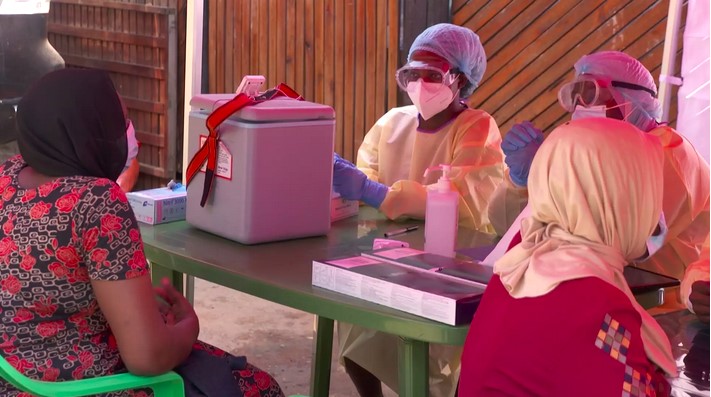KAMPALA, February 25th (AMSP/CGTN) – – Ugandan health authorities say they remain on high alert, despite discharging the eight patients who had been receiving hospital treatment for an Ebola infection. The disease killed one person last month, sparking fears of a wide-spread outbreak. Authorities prevented that, but they say they’ll continue to monitor the dozens of people who remain in isolation.
Ezra Byegarazo walked to freedom following weeks in isolation, after being declared Ebola free. Byegarazo, who was still nursing Ebola symptoms, was one of the health workers who came in contact with the nurse who died of the disease in January. Mentally, catching Ebola has drained him, he says.
“The psycho-social support I received from the team you’ve just seen here … .of course at some point I felt life was going but with faith and my supporting family and the team around whom I believed in so much, because that was the only option left,” Byegarazo said.
Seven other survivors were also discharged. But more than 100 people remain under strict monitoring in various facilities in the country. The Ministry of Health says none has shown any signs of Ebola, but will stay under quarantine for 21 days from the time they were exposed.
The Health Ministry is urging the public to remain vigilant and report any suspicious cases to health facilities as Heightened public health risk communication and community engagement continues.
The outbreak was declared on January 30th, following the death of a nurse, and authorities say it is now under control after certain steps were taken.
“One is tracing and identifying all contacts, two is strict monitoring for signs and symptoms, three is isolating symptomatic contacts and testing their samples for the virus,” Ugandan Minister for Health Jane Ruth Aceng said.
The World Health Organization has been providing technical and financial support to the East African country.
And as more people walk out of isolation, communities have been implored to be welcoming as they are no risk to public health.
“There is a need to continue working with communities to support survivors, to successfully reintegrate in their communities and live normal lives like before,” Kasonde Mwinga, Uganda Country Representative of World Health Organization underscored.
Ebola is a severe and often fatal viral disease that spreads through direct contact with infected body liquids or contaminated objects. Symptoms include, fever, fatigue, headache, restlessness, vomiting and unexplained bleeding.
amsp/cgtn-abp
CGTN

